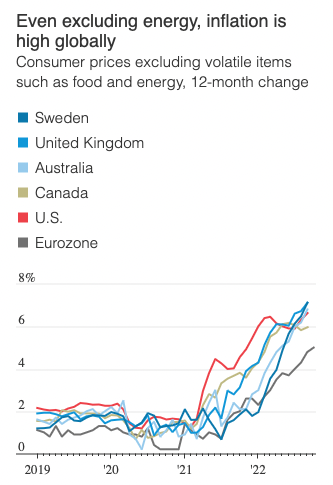
The crypto meltdown did us a favor. Crypto became a $3 trillion asset class with bank-like intermediaries but few connections to actual banking. So its implosion has had no spillovers. My column explores: wsj.com/articles/how-c…
2/ Like banking, crypto is highly leveraged and interconnected; fire sales, contagion, caused one failure to ripple through to others. Crypto companies listed "customers" and other crypto companies as major creditors; no banks, as far as we can tell.
3/ This diagram from the federal Financial Stability Oversight Council nicely illustrates the web of connections with bankrupt hedge fund Three Arrows Capital at center home.treasury.gov/system/files/2… 

4/ Crypto didn't have strong links to real finance because, unlike bonds, mortgages, loans, derivatives, it had no real economic value; unused in payments except ransomware, money laundering. Stablecoins, DeFi used primarily to speculate in crypto. wsj.com/articles/crypt…
5/ So major banks, regulators kept it at arm's length. But in time, the speculative profits and rents percolating through the crypto ecosystem would have inexorably expanded the linkages. 2022 meltdown has halted that, may have prevented a more damaging crisis later on.
6/ Having completely failed as an alternative to the dollar, crypto had been seeking to become an alternative to equities with less regulation, investor protection. This year's meltdown disrupts that, too; for how long is unclear. wsj.com/articles/ftx-c…
7/ To be sure some banks have exposure; private equity investment, payment services, some loans. Smaller banks that catered to crypto are being buffeted by deposit outflows wsj.com/articles/crypt…
8/ But this is qualitatively different from the sort of exposure that threatens the capital & health of major lending institutions & broader financial system.
9/ Crypto this year resembles free banking in the early 1800s. Banking was saved by introduction of a single national currency, lender of last resort, deposit insurance, comprehensive regulation. But I don't think that recipe works for crypto ...
10/ Bank-like regulation would negate the efficiency, anonymity that supposedly makes crypto superior to fiat. U.S. needed banks, currency & thus had to find a regulatory solution to banking instability. It doesn't need crypto; fiat currency, regular banks are working just fine.
11/ Thank you to my terrific colleagues @pkwsj @mccabe_caitlin and @vlajournaliste for their advice and help in my reporting and their cutting edge coverage of crypto. The contents of the column & this thread are my responsibility.
A correspondent points me to this NY Times report of FTX's investment in a tiny one-branch bank. This looks like too small a connection to create a systemic issue. But whether similar links exist elsewhere bears watching - esp by regulators. nytimes.com/2022/11/23/bus…
• • •
Missing some Tweet in this thread? You can try to
force a refresh







